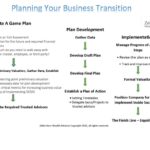Your ExitMap Blog gathers contributions from top exit planning professionals across the country that are indexed into four categories. They include select strategies for planning your exit, ideas for building your company’s value, transfer options you can choose from, or preparing to enjoy your post-exit lifestyle. This page shows the most recent posts from Your ExitMap Blog. If you are seeking a qualified exit planning professional, you can view a map of specialists here.
All articles are copyrighted by the authors, and reprinted here with permission. Each author’s contact information is available via a link at the end of the article.
Most Recent Your ExitMap Blog Articles
Most Recent Blog Articles
Goals and Resolutions There is a difference between goals and resolutions. Businesses set goals. These can be budgetary, operational, recruiting, sales or profit oriented. Individuals make resolutions. Business Goals Goals are focused on a particular outcome, and so should be specific. It’s worth the time to get into the details. If you intend to increase the company’s cash flow, how will that be done? If it’s by boosting sales, what has to change to make that happen? You could add a new product line or enter additional territory. It may require hiring and training new salespeople. You can also increase the cash flow by reducing your Cost of ... Read more There is a difference between goals and resolutions. Businesses set goals. These can be budgetary, operational, recruiting, sales or profit oriented. Individuals make resolutions. Business Goals Goals are focused on a particular outcome, and so should be specific. It’s worth the time to get into the details. If you intend to increase the company’s cash flow, how will that be done? If it’s by boosting sales, what has to change to make that happen? You could add a new product line or enter additional territory. It may require hiring and training new salespeople. You can also increase the cash flow by reducing your Cost of ... Read more How To Set Goals for Yourself That You’re Passionate About Accomplishing Whether we set New Year’s resolutions at the beginning of the year or any other point during the year, we often desire to challenge ourselves and set goals for personal growth and achievement. Too frequently, goals are established and later abandoned as we shift our focus to other priorities and distractions. How do we set goals for ourselves that we are genuinely excited about pursuing and accomplishing and that motivate us to stay focused on reaching them? Over the years, I have provided planning guidance to individuals, and I have concluded that there is likely a particular approach to setting goals that is pursued more ... Read more Whether we set New Year’s resolutions at the beginning of the year or any other point during the year, we often desire to challenge ourselves and set goals for personal growth and achievement. Too frequently, goals are established and later abandoned as we shift our focus to other priorities and distractions. How do we set goals for ourselves that we are genuinely excited about pursuing and accomplishing and that motivate us to stay focused on reaching them? Over the years, I have provided planning guidance to individuals, and I have concluded that there is likely a particular approach to setting goals that is pursued more ... Read more Deal Momentum, Deal Fatigue, and Pre-Sale Diligence With the help of her Exit Planning Advisor, Betty has decided that selling to a third-party buyer would best accomplish all of her goals (financial, values-based, legacy). Quantifying her business and personal resources with a financial gap analysis has been helpful to Betty in determining her departure date in six years. She now knows the current fair market value of her business and how much it will need to increase in value to attain her financial objectives at sale in six years. Betty now also understands (again with the help of her Exit Planning Advisor) the importance of maintaining “deal momentum” when she eventually enters ... Read more With the help of her Exit Planning Advisor, Betty has decided that selling to a third-party buyer would best accomplish all of her goals (financial, values-based, legacy). Quantifying her business and personal resources with a financial gap analysis has been helpful to Betty in determining her departure date in six years. She now knows the current fair market value of her business and how much it will need to increase in value to attain her financial objectives at sale in six years. Betty now also understands (again with the help of her Exit Planning Advisor) the importance of maintaining “deal momentum” when she eventually enters ... Read more The Power Of Strategic Exit Planning In today’s business landscape, having a strategic exit plan is not just a luxury—it’s essential. Effective exit planning involves setting clear goals, understanding your business’s value, and creating a detailed roadmap to achieve a smooth transition. Starting early with your exit plan allows you to set precise objectives and assess your business’s value well in advance. This proactive approach provides the flexibility to adapt to changing market conditions and business performance, ensuring that your exit strategy remains relevant and achievable. In today’s business landscape, having a strategic exit plan is not just a luxury—it’s essential. Effective exit planning involves setting clear goals, understanding your business’s value, and creating a detailed roadmap to achieve a smooth transition. Starting early with your exit plan allows you to set precise objectives and assess your business’s value well in advance. This proactive approach provides the flexibility to adapt to changing market conditions and business performance, ensuring that your exit strategy remains relevant and achievable. What is “Holistic” Planning? Financial planners use the term “holistic planning” frequently. It’s meant to indicate that they consider the client’s short- and long-term life goals and the future they visualize. According to Fidelity Investments Holistic Wealth Planning is continuous and considers two dozen aspects of client wealth objectives. The Valuation Reality Gap - Only one of those aspects is ownership of a business. Financial planners use the term “holistic planning” frequently. It’s meant to indicate that they consider the client’s short- and long-term life goals and the future they visualize. According to Fidelity Investments Holistic Wealth Planning is continuous and considers two dozen aspects of client wealth objectives. The Valuation Reality Gap - Only one of those aspects is ownership of a business. Build a Successful Business Exit Plan by Using a Planning Process As a business owner, planning the exit from ownership of your business is probably the single most important decision you will make. When to exit, how much to walk away with, who to sell it to, what’s the most tax efficient strategy in your circumstance, what timeline is most suitable, and what are the areas of business that need to be improved upon to make it marketable, etc.? Those are just some of the things that need to be considered. As a business owner, planning the exit from ownership of your business is probably the single most important decision you will make. When to exit, how much to walk away with, who to sell it to, what’s the most tax efficient strategy in your circumstance, what timeline is most suitable, and what are the areas of business that need to be improved upon to make it marketable, etc.? Those are just some of the things that need to be considered. Top 3 Tips for Small Business Buyers We review over a hundred small business transactions each year. Buying a business can be a complicated process, especially for a first-time business owner. Entrepreneurship through acquisition “ETA” has become increasingly popular, but we wanted to share some insights to assist buyers in negotiating a fair price. 1. Add-backs - Seller add-backs for personal or discretionary spending is a murky area. An an appraiser, some add backs make sense and others do not. We review over a hundred small business transactions each year. Buying a business can be a complicated process, especially for a first-time business owner. Entrepreneurship through acquisition “ETA” has become increasingly popular, but we wanted to share some insights to assist buyers in negotiating a fair price. 1. Add-backs - Seller add-backs for personal or discretionary spending is a murky area. An an appraiser, some add backs make sense and others do not. Cash Flow Normalization Cash flow normalization is done with the intention of identifying Earnings Before Interest Taxes Depreciation and Amortization (EBITDA) or Seller’s Discretionary Earnings (SDE). These differing measures are not interchangeable, but are used by different classes of buyers for different categories of acquisition. Cash flow normalization is done with the intention of identifying Earnings Before Interest Taxes Depreciation and Amortization (EBITDA) or Seller’s Discretionary Earnings (SDE). These differing measures are not interchangeable, but are used by different classes of buyers for different categories of acquisition. What is an Exit Plan? "What is an Exit Plan" is an article I wrote ten years ago. It was just brought to my attention and I realized I never posted it to Awake for some reason. Here, with some updating, we celebrate its 10th anniversary.
Exit planning is the buzzword for those who consult to Baby Boomer business owners. Business brokers, wealth managers and other professionals are adding “exit planning” to their marketing messages. "What is an Exit Plan" is an article I wrote ten years ago. It was just brought to my attention and I realized I never posted it to Awake for some reason. Here, with some updating, we celebrate its 10th anniversary.
Exit planning is the buzzword for those who consult to Baby Boomer business owners. Business brokers, wealth managers and other professionals are adding “exit planning” to their marketing messages. Purpose – Life After the Sale Part 3 The third component of life after the sale is Purpose – “Having as one’s intention or objective.” Many exit planning advisors discuss the three legs of the exit planning stool – business readiness, financial readiness, and personal readiness. In our previous two articles, we focused on two of the “big three” components of a successful life after the sale, activity and identity. The third is purpose. The third component of life after the sale is Purpose – “Having as one’s intention or objective.” Many exit planning advisors discuss the three legs of the exit planning stool – business readiness, financial readiness, and personal readiness. In our previous two articles, we focused on two of the “big three” components of a successful life after the sale, activity and identity. The third is purpose.
|
|
Keystone Content: Are you just beginning your exit planning journey? Here are two short articles from Your ExitMap Blog to help get you started. 3 Inarguable Reasons How prepared are you to Take a FREE 15-minute FIND A QUALIFIED EXIT PLANNER |




